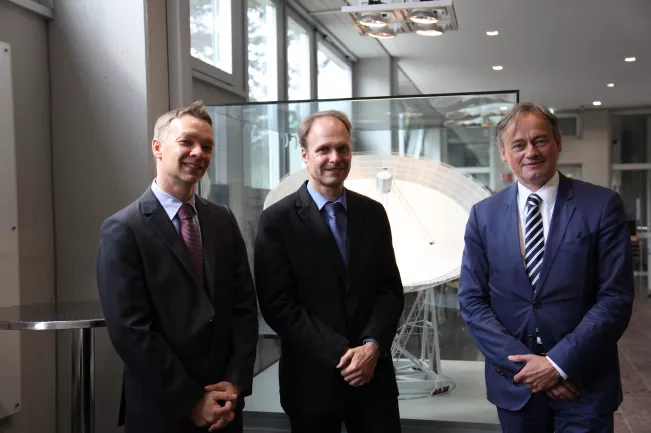Communications and Marketing
H-BRS and Max Planck Society cooperate

Within this partnership, University Professor Dr Bernd Klein is setting up a department for digital signal processing at the MPIfR. Dr Klein will continue to offer courses and conduct examinations at the Department of Electrical Engineering, Mechanical Engineering and Technical Journalism.
In accordance with the preamble to the agreement, the university and the Max Planck Society intend to build a fruitful partnership and expand the academic excellence of the institutions involved. Another positive effect is the establishment of a regional competence network in research, tuition and education of young researchers in the areas of radioastronomy and the relevant technologies.
“Bonn-Rhein-Sieg University also expects to receive important incentives and input of scientific expertise into the university from cooperation with outside research institutes conducting fundamental research,” said President Hartmut Ihne.
“The 40-years-plus history of North Rhine-Westphalian universities of applied sciences is a success story. This is currently highlighted by Bonn-Rhein-Sieg University’s cooperation with the Max Planck Society, which sets high standards and serves as a role model. Universities of applied sciences are an integral part of our country’s educational system. We need them to face the present and future challenges,” said Svenja Schulze, North Rhine-Westphalian Minister of Science.
Some time before the agreement was signed, Professor Dr Michael Kramer, Executive Director of MPIfR, had already granted visiting status to Professor Klein in respect of his research projects. The main reason was that Klein had already headed the MPIfR Laboratory for Digital Technology for many years before he joined the university of applied sciences in Sankt Augustin. According to Dr Kramer, the aim of the new department is technical instrumentation: it supports the other technical MPIfR departments in developing receivers. “As a result, we assembled groups whose members have previously worked in other technical departments,” he said. At the MPIfR, there are three directors with roughly 300 staff members, including 100 researchers and 60 post-doctorate and PhD students.
“For me, the new activity is like winning the lottery,” Prof. Klein said with a smile. He added that his new Department for Digital Signal Processing brought together a considerable body of expertise. From his point of view, he said, it was essential to establish such a department in order to meet an enormous increase in demand. He pinpointed what made his work particularly appealing, “As an academic head of the new department I will not only be coordinating the subject-related projects of the entire institute, but I will also be able to conduct new research and development projects and develop my own ideas.” At the beginning of May, Prof. Klein went to the USA in order to pursue his research activities in radioastronomy. In July, he will, once again, ascend 13 kilometres into space on board the aeroplane observatory SOFIA (stratosphere observatory for infrared astronomy), departing from New Zealand.
Additional personal information
Having graduated from school, Professor Dr Bernd Klein (47) initially completed an apprenticeship and afterwards enrolled in a study programme in Electrical Engineering/Technical Computer Science at the Gießen-Friedberg University of Applied Sciences, thus acquiring the academic degree of ‘Diplom-Ingenieur’ (graduate engineer). He subsequently completed a supplementary degree programme in General Electrical Engineering at Siegen University. His thesis for this course of study was completed at the Max Planck Institute for Radioastronomy – and this is where the wheel came full circle: the topic was ‘How to Use and Programme a Digital Signal Processor’.
In his PhD thesis, too, Dr Klein dealt with the endless expanse faced when ‘searching for widely dispersed radio pulsars pointing to the galactic centre’. The assessment he achieved – a 2.0 (magna cum laude) - may also be considered ‘galactic’. Before he was appointed as ‘Professor for Electronic Circuit and Microprocessor Technology’ by Bonn-Rhein-Sieg University’s Department of Electrical Engineering, Mechanical Engineering and Technical Journalism, he had headed the digital laboratory at the MPIfR, which has now been integrated into his new department. Bernd Klein is married and has a daughter. He lives in Alfter with his family.
Sie haben noch Fragen?

[Archive] Eva Tritschler
Press and Public Relations, Spokeswoman/Editor-in-Chief of the university magazine doppelpunkt:
Location
Sankt Augustin
Address
Grantham-Allee 20
53757 Sankt Augustin